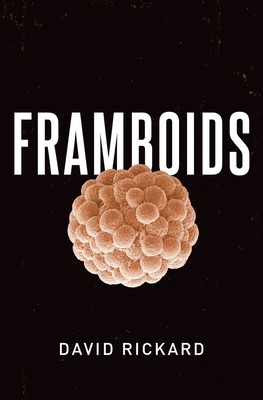
- We will send in 10–14 business days.
- Author: David Rickard
- Publisher: Oxford University Press, USA
- ISBN-10: 0190080116
- ISBN-13: 9780190080112
- Format: 16.4 x 24.1 x 2.4 cm, hardcover
- Language: English
- SAVE -10% with code: EXTRA
Reviews
Description
Framboids may be the most astonishing and abundant natural features you've never heard of. These microscopic spherules of golden pyrite consist of thousands of even smaller microcrystals, often arranged in stunning geometric arrays. They are rarely more than twenty micrometers across, and often look like miniscule raspberries under the microscope. The formation of a framboid is the result of self-assembly of pyrite micro- and nano-crystals under the influence of surface forces. They can be found all around us in rocks of all ages and present-day sediments, soils, and natural waters. Our planet makes billions every second and has been doing so for most of recorded geologic time. As a result, there are more framboids on our planet than there are sand grains on Earth or stars in the observable universe. The microscopic size of framboids belies their importance to contemporary science. They help us better understand inorganic self-assembly and self-organization, and studying them illuminates Earth's evolutionary history. In this book, David Rickard explains what framboids are, how they are formed, and what we can learn from them. The book's thirteen chapters trace everything from their basic attributes and mineralogy to their biogeochemistry and paleoenvironmental significance. Rickard expands on the most updated research and recent developments in geology, chemistry, biology, materials science, biogeochemistry, mineralogy, and crystallography, making this a must-have guide for researchers.
EXTRA 10 % discount with code: EXTRA
The promotion ends in 18d.09:51:03
The discount code is valid when purchasing from 10 €. Discounts do not stack.
- Author: David Rickard
- Publisher: Oxford University Press, USA
- ISBN-10: 0190080116
- ISBN-13: 9780190080112
- Format: 16.4 x 24.1 x 2.4 cm, hardcover
- Language: English English
Framboids may be the most astonishing and abundant natural features you've never heard of. These microscopic spherules of golden pyrite consist of thousands of even smaller microcrystals, often arranged in stunning geometric arrays. They are rarely more than twenty micrometers across, and often look like miniscule raspberries under the microscope. The formation of a framboid is the result of self-assembly of pyrite micro- and nano-crystals under the influence of surface forces. They can be found all around us in rocks of all ages and present-day sediments, soils, and natural waters. Our planet makes billions every second and has been doing so for most of recorded geologic time. As a result, there are more framboids on our planet than there are sand grains on Earth or stars in the observable universe. The microscopic size of framboids belies their importance to contemporary science. They help us better understand inorganic self-assembly and self-organization, and studying them illuminates Earth's evolutionary history. In this book, David Rickard explains what framboids are, how they are formed, and what we can learn from them. The book's thirteen chapters trace everything from their basic attributes and mineralogy to their biogeochemistry and paleoenvironmental significance. Rickard expands on the most updated research and recent developments in geology, chemistry, biology, materials science, biogeochemistry, mineralogy, and crystallography, making this a must-have guide for researchers.


Reviews